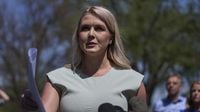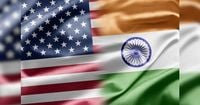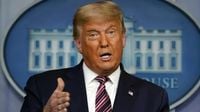In a significant escalation of trade tensions, India has imposed a 100% tariff on agricultural products imported from the United States, a move that has drawn sharp criticism from the White House. The announcement was made by White House Press Secretary Karoline Leavitt on April 1, 2025, just a day before U.S. President Donald Trump is set to unveil his proposed reciprocal tariffs on all trade partners.
Leavitt emphasized that these high tariffs from other nations make it "virtually impossible" for U.S. products to compete in international markets. She stated, "Unfortunately, these countries have been ripping off our nation for far too long, and they’ve made, I think, their disdain for the American workers quite clear." She highlighted the steep tariffs faced by American exporters, including a 50% tariff from the European Union on dairy products, a staggering 700% tariff from Japan on rice, and approximately 300% from Canada on American butter and cheese.
President Trump has long criticized the high tariffs imposed by India and other countries, framing them as unfair barriers to American goods. His upcoming tariffs, set to take effect on April 2, 2025, have been dubbed "Liberation Day" for the United States. Trump told reporters aboard Air Force One on March 31, 2025, that these tariffs would apply to all countries without exception, indicating a broad and sweeping approach to trade policy.
Earlier in March, Trump had hinted that the tariffs would be "temporary" and "small ones," but he later clarified that the predominant tariffs would be reciprocal in nature and would represent a "big game-changer for our country." This shift in strategy has raised concerns about potential retaliatory measures from key trading partners.
The White House has pointed to India's 100% tariff on American agricultural products as a critical factor in the decision to impose reciprocal tariffs. "If you look at the unfair trade practices - we have 50% (tariff) from the European Union on American dairy and a 700% tariff from Japan on American rice. You have a 100% tariff from India on American agricultural products and nearly 300% from Canada on American butter and cheese," Leavitt reiterated.
Despite the rising tensions, there have been ongoing discussions between the U.S. and India regarding a bilateral trade agreement. Reports suggest that India may be willing to cut tariffs on certain U.S. agricultural imports, such as almonds and cranberries, in an effort to strengthen trade ties. However, no formal agreements have been reached, and the imposition of high tariffs complicates the negotiations.
Trump has previously expressed admiration for Indian Prime Minister Narendra Modi, labeling him a "very smart man" and a great friend. During a recent discussion, Trump noted, "Prime Minister Modi was here just recently, and we've always been very good friends. India is one of the highest-tariffing nations in the world... They're very smart." This relationship, however, is now being tested as both countries navigate the complexities of trade tariffs.
The impending tariffs have sparked fears of a trade war, with critics warning that retaliatory measures could follow from major partners like China, Canada, and the EU. In anticipation of Trump's announcement, China, South Korea, and Japan have reportedly begun strengthening their trade ties to mitigate potential fallout.
Trump's aggressive tariff strategy is designed to protect American industries from what he describes as unfair international competition. He believes that these measures will not only generate revenue for the federal government but also serve as leverage in negotiating concessions from other nations.
As the clock ticks down to the announcement of the new tariffs, the global trading community watches closely. The President's assertion that reciprocal tariffs will extend to all nations, rather than a select group, adds a layer of uncertainty to the international trade landscape.
In a recent statement, Trump emphasized the need for change, saying, "It’s time for reciprocity, and it’s time for a president to make a historic change, to do what’s right for the American people." The implications of these tariffs could resonate far beyond U.S.-India relations, potentially reshaping global trade dynamics.
As the situation develops, both U.S. and Indian officials will need to tread carefully to avoid a full-blown trade war that could have detrimental effects on economies worldwide. With the stakes so high, the coming days will be crucial in determining the future of U.S.-India trade relations.



